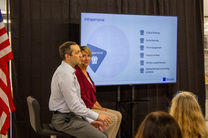The manufacturing industry in North America is undergoing its fourth evolution into a high-technology, digitalized, and data-driven industry. This Industry 4.0 period began long before the COVID-19 pandemic affected global society but has been accelerated in response to many of the challenges associated with it. In this report, we examine and explore the current manufacturing industry in North America and the challenges and opportunities it faces as adoption of Industry 4.0 thinking, tools, standards, and processes becomes more widespread.
The manufacturing industry in North America is undergoing its fourth evolution into a high-technology, digitalized, and data-driven industry. This Industry 4.0 period began long before the COVID-19 pandemic affected global society but has been accelerated in response to many of the challenges associated with it. In this report, we examine and explore the current manufacturing industry in North America and the challenges and opportunities it faces as adoption of Industry 4.0 thinking, tools, standards, and processes becomes more widespread.


About the Event
Step into the future of manufacturing work at the Smart Factory Workforce Conference. Designed for plant managers, operations leaders, HR professionals, and training leaders, this event delivers actionable insights for navigating today’s evolving manufacturing workforce.
Explore how Industry 4.0 advancements are reshaping job design, workforce skills, and the employee experience. Featuring research from the University of Tennessee at Chattanooga’s Industrial-Organizational Psychology department, this conference highlights practical strategies to reskill, upskill, and retain talent in an increasingly digital environment.
Don’t miss your opportunity to gain forward-looking insights, engage with industry leaders, and prepare your organization for the future of work.
EVENT WILL START IN
TICKETS
Keynote Presenter
2026 CONFERENCE AGENDA
(Speaker list is being continuously updated.)
Register & Networking
8:30am
Registration & Networking
9:00am
Welcome

Denise (Rice) Hall
President & CEO, Peak Performance Inc., Operators of the Smart Factory Institute
FIRESIDE CHAT
9:15am
Preparing the New Collar Worker for Success in Smart Factories
This fireside chat explores how manufacturers, policymakers, and workforce leaders can better prepare the new-collar workforce for success in smart factory environments. Featuring insights from Dr. Chris Cunningham; Industrial and Organizational Psychology Graduate Program Director, University of Tennessee at Chattanooga and TBD (U.S. Department of Labor, National Association of Manufacturers). The conversation will focus on aligning skills training, with the evolving demands of Industry 4.0. Speakers will discuss talent readiness, reskilling and upskilling strategies, and the collaboration needed between industry, education, and government to build a resilient, future-ready manufacturing workforce.

Dr. Chris Cunningham
UC Foundation Professor of Psychology, The University of Tennessee at Chattanooga Director, Industrial and Organizational Psychology Graduate Program Director, UTC

BREAK & NETWORKING
10:00am
Break & Networking
DISCUSSION GROUP WORKSHOPS
10:15am
Igniting Motivation and Retention in the Workforce
Understand workers’ essential needs and how those needs are met through their work within an Industry 4.0 environment. Participants will examine total rewards strategy, incentive plans, and the design of competitive total rewards packages, along with practical strategies for engaging and embedding talent to reduce turnover and minimize the risk of talent poaching.
Adapt, Evolve, Succeed; Actionable approaches to change managememt.
This Focus Group session will discuss how to effectively communicate during times of change, track workforce transformation, and evaluate the impact of workforce training initiatives. Share best pratices on how to address industry 4.0 change anxiety and resistance while establishing strategies to support employees through transitions. Participants will explore approaches to future-proof their manufacturing workforce by building adaptability, resilience, and long-term capability.
New Talent, New Opportunities
Explore strategies for engaging and attracting emerging talent in today’s manufacturing environment. Discuss essential approaches to tracking and recruiting talent, crafting a compelling and engaging employer brand and message for Industry 4.0 manufacturing, and helping candidates develop realistic expectations about working in manufacturing within your organization. Help candidates develop realistic expectation on working in manufacturing environments.Participants will learn how to effectively screen candidates for critical Industry 4.0 knowledge, skills, abilities, and other competencies (KSAOs) to ensure long-term success and fit.
Smart metrics for Smart workers, driving performance excellence.
Discuss how to evaluate and manage smart worker performance using data-driven management and coaching practices. This session focuses on avoiding information overload, managing for safety, and leading effectively in human- machine augmented team environments. Participants will gain practical strategies to leverage data insights while supporting employee well-being, productivity, and performance in modern Industry 4.0 workplaces.
Harnessing Advanced Tools for Effective Training.
Analyze how to use artificial intelligence and augmented reality to enhance work assessments and training programs. This session explores how advanced digital tools can improve skill evaluation, personalize learning, and support workforce development in modern manufacturing and Industry 4.0 environments.
BREAK & NETWORKING
11:00am
Break & Networking
FOCUS GROUP SHARE OUT
11:15am
Discussion Group Report out
CLOSING REMARKS
12:00pm
Closing Remarks

Denise (Rice) Hall
President & CEO, Peak Performance Inc., Operators of the Smart Factory Institute
LUNCH & NETWORKING
12:15pm
Lunch & Networking

OPTIONAL TOUR
1:00pm

























